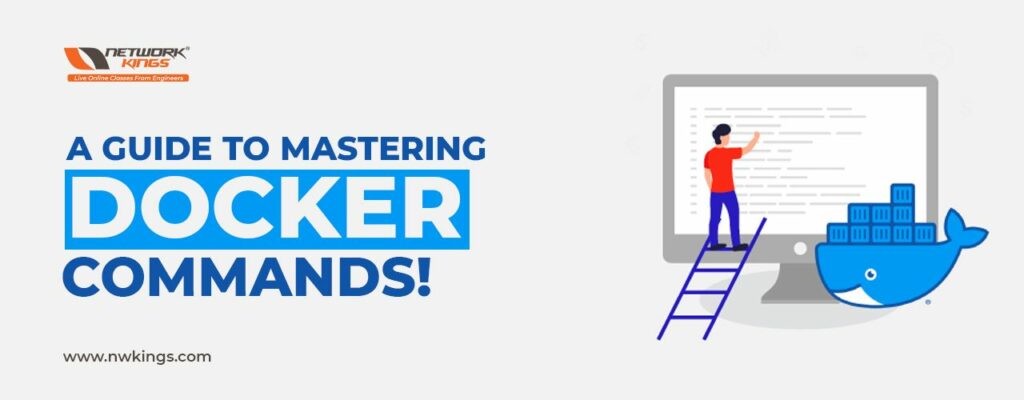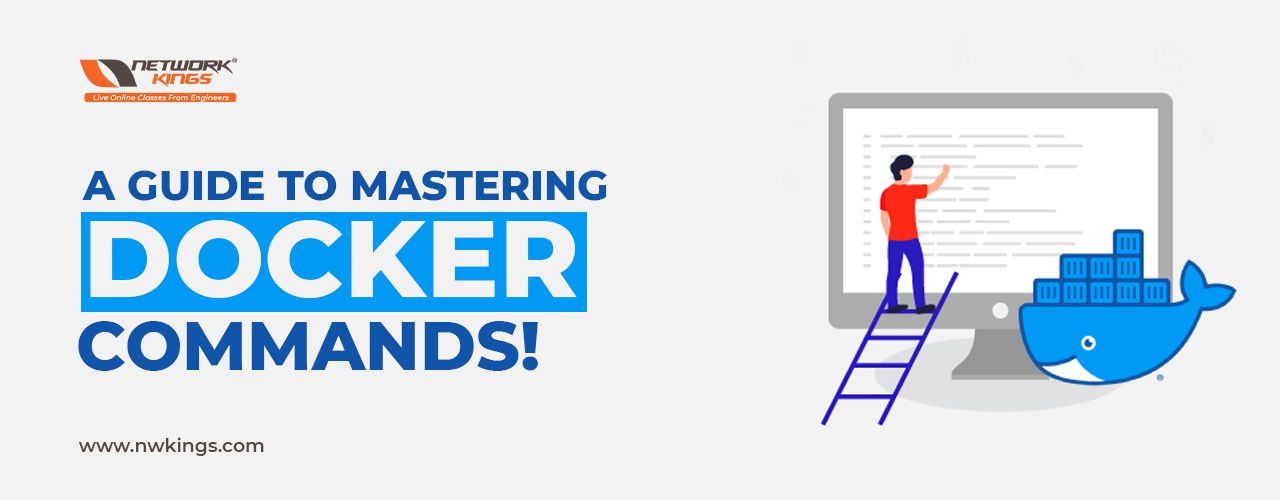
Are you curious to know about the Docker Command List? Let us explore all about the Docker command List.
Docker is an open platform for creating, shipping, and handling applications. Docker allows you to separate your applications from your infrastructure so that you can have software quickly. With Docker, you can control your infrastructure in the same ways you handle your applications.
This blog will cover the basic Docker command list and its practical applications.
What is Docker?
Before diving into the Docker Command List, let us explore what docker is.
Docker is a tool that lets developers package their applications into containers. Containers are separated environments that share the host machine’s kernel. This means that various containers can run on the same machine without interrupting each other.
Containers are a wonderful way to deploy applications because they are lightweight and portable. They can be run on any machine that has the Docker engine installed. This makes them perfect for cloud computing and constant integration/continuous delivery (CI/CD) workflows.
To start a container, you first need to make a Dockerfile. A Dockerfile is a text file that includes instructions for how to build a container image. Once you have formed a Dockerfile, you can build the image using the docker build command.
Once you have built an image, you can run it using the docker run command. The docker run command will create a container from the selected image.
Containers can be stopped and started at any time. They can also be connected to build complex applications.
Docker is a strong tool that can facilitate the growth and deployment of applications. It is a popular choice for developers who like to create and deploy cloud-native applications.
How to Get Started with Docker?
Docker is a platform that allows you to create, deploy, and manage container applications. Containers are separated, lightweight, and portable, making them ideal for running applications in numerous environments.
To get started with Docker, you must install it on your machine. Once you have Docker installed, you can make a Dockerfile. A Dockerfile is a text file that includes instructions for making a Docker image.
To build a Docker image, you’ll need to run the docker build command. This command will take the Dockerfile and build an image based on the instructions in the file.
Once you have a Docker image, you can handle it using the docker run command. This command will create a container based on the image.
To control your Docker containers, you can utilize the docker ps command. This command will list all of the running containers. You can also employ the docker stop command to prevent a container, and the docker rm command to remove a container.
What is the Basic Docker Commands List?
Here are some of the basic docker command lists for images.
`docker pull [image]`: Downloading an image from Docker Hub
`docker build -t [tag] .`: Building an image from a Dockerfile
`docker images`: Listing all downloaded images
`docker rmi [image]`: Removing an image
– `docker run [image]`: Creating and starting a container
– `docker ps`: Listing running containers
– `docker stop [container]`: Stopping a container
– `docker rm [container]`: Removing a container
– `docker exec -it [container] [command]`: Executing commands in a running container
How to Troubleshoot Common Docker Issues?
- Choose the Docker menu and then Troubleshoot
- Select the Troubleshoot icon near the top-right corner of the Docker Dashboard.
- Restart Docker Desktop.
- Get support. Users with a paid Docker subscription can use this option to transmit a support demand. Other users can use this option to analyze any issues in Docker Desktop. For more information, see Diagnose and Feedback and Support.
- Reset Kubernetes cluster. Select to delete all stacks and Kubernetes resources.
- Clean / Purge data. This option resets all Docker data without a reset to factory defaults. Choosing this option results in the loss of existing settings.
- Reset to factory defaults: Choose this option to reset all options on Docker Desktop to their initial state, the same as when Docker Desktop was first installed.
How to Master the Docker Commands List?
Mastering the Docker command list is essential for effectively working with Docker containers. Here are some steps to help you in mastering Docker commands:
- Understand the basics: Familiarize yourself with the basic concepts of Docker, such as containers, images, and Dockerfile. This foundational knowledge will help you grasp the purpose and functionality of the Docker commands.
- Learn the commonly used commands: Start by learning the commonly used Docker commands. These include:
- docker run: This command is used to create and start a new container from an image.
- docker stop: It stops a running container.
- docker rm: It removes a stopped container.
- docker pull: It downloads an image from a registry.
- docker push: It uploads an image to a registry.
- docker build: It builds a new image from a Dockerfile.
- docker ps: It lists the running containers.
- docker images: It lists the available images.
- docker exec: It runs a command inside a running container.
Understanding these commands will allow you to perform common tasks with Docker.
- Refer to the official documentation: Docker provides comprehensive documentation that covers all the available commands and their usage. The official documentation is an excellent resource for understanding the details of each command, including the available options and their effects.
- Practice with examples: To reinforce your understanding, practice using the Docker commands with real-world examples. Create and manage containers, build custom images, and explore different options and configurations. This hands-on experience will help you become comfortable with the commands and their usage.
- Explore advanced commands: Once you are familiar with the basic commands, dive into the more advanced Docker commands. These include networking, volume management, container orchestration, and security-related commands. Understanding these advanced commands will enable you to work with Docker in complex scenarios and optimize your containerized applications.
- Stay up to date: Docker is an evolving technology, and new features and improvements are regularly introduced. Stay up to date with the latest releases and changes in Docker by referring to the official Docker blog, attending webinars, or joining relevant online communities.
Remember, mastering the Docker commands list requires practice and hands-on experience. By following these steps and continually experimenting with Docker, you can become proficient in managing containers efficiently.
What is a Docker Training?
Docker is an open medium that allows users to create, ship, and operate applications with ease. Docker software is packed in the form of containers- a docker standardized unit. These containers have all the components, such as system tools, libraries, runtime, and many more required by the software.
Docker training is a suite of software development tools for building, sharing, and handling individual containers. The Docker Training also trains you to use the Docker command list.
What skills will you learn in the Docker Training?
The skills you will learn in the Docker Training are:
- Container Basics
- Docker images and public registry
- Docker Private Registry
- Docker Networking
- Docker Storage
- Building Docker Image
- Docker Compose
- Container Orchestration and Management
- Deploying highly available and scalable application
What are the prerequisites for Docker Training?
Here is a list of prerequisites for Docker Training:
- Graduation in any field.
- Introductory knowledge of the IT industry.
- Basic understanding of establishing and configuring applications.
- Understanding Virtualization and Linux.
- Fundamental knowledge of Cloud management.
What is the scope of Docker Training?
The scope of Docker Training is wide. You can enhance your Cloud Computing and Containerization skills with our Docker training. The scope of the course is as follows:
- High salary: One can earn a considerable amount of salary with our Docker training.
- Career advancement: You can get career advancement with a Docker certificate and learn to deploy these skills.
- In-demand skills: Docker training is the most in-demand skill in the modern era with the increase in demand for cloud computing.
- Diversity in learning: The learner gets a chance to learn various tools and ecosystems with the Docker training all at once as it contains numerous tools deployment.
Why Network Kings for a Docker course?
Network Kings is the best platform for the Docker course because it offers courses with experts. Let us discuss the benefits of learning a Docker course.
- Networking: Build your network with our team to connect with them for the best Networking training.
- Comprehend with the best: Learn from industry professional experts.
- Structured Learning: Network King’s curriculum gives the best learning experience, designed by professionals.
- Gain Certification: You will get certification with our Networking certification course. It will improve your resume and career opportunities.
- World’s largest labs: Network Kings have 24/7 access to virtual labs with zero downtime.
- Career Guidance: With Network Kings, you will get a career consultant via career consultants.
- Tricks for Interviews: Network Kings will offer tips and tricks to crack interviews and exams.
- Recorded lectures: With recorded lectures, you will get access to the recorded lectures to learn at flexible hours progress.
What are the exam details of the Docker Training?
Here are the exam details of the Docker training:
Docker Certified Associate (DCA):
The details of the DCA exam are as follows:
Exam Name: DCA (Docker Certified Associate)
Exam Cost: USD 195
Exam Format: Multiple-choice questions
Total Questions: 55 questions
Passing Score: 65% or higher
Exam Duration: 90 minutes
Languages: English, Japanese
Testing Center: Pearson VUE
Certification validity: 2 years
What are the job opportunities after the Docker Training?
Here are the job roles after the Docker course:
- Docker Administrator
- DevOps Engineer
- Cloud Engineer
- Site Reliability Engineer (SRE)
- Infrastructure Engineer
- Kubernetes Developer
- Docker Developer
- Microservices Developer
- Cloud Operations Engineer
- Cloud Solutions Architect
- Containerization Architect
- Docker Consultant
- Cloud Security Engineer
- Continuous Integration and Deployment (CI/CD) Engineer
- Systems Administrator
- Cloud Migration Specialist
- Cloud Automation Engineer
- Cloud Platform Engineer
What are the salary expectations after the Docker Training?
Here are the salary prospects for Docker candidates:
- India: INR 6-15 lakhs per annum
- China: CNY 150k-300k per annum
- USA: USD 80k-150k per annum
- UK: GBP 35k-70k per annum
- Japan: JPY 6-12 million per annum
- France: EUR 35k-70k per annum
- Germany: EUR 40k-80k per annum
- South Africa: ZAR 240k-600k per annum
- Netherlands: EUR 45k-90k per annum
- Singapore: SGD 50k-120k per annum
- Australia: AUD 70k-140k per annum
- Brazil: BRL 60k-120k per annum
- Switzerland: CHF 80k-160k per annum
Conclusion
Using the Docker command list, you can start, run, stop, clear, and manage Docker containers easily. These commands can help you automate and simplify the method of deploying and operating your applications in a containerized environment.
Docker is an open platform for creating, shipping, and handling applications. Docker allows you to isolate your applications from your infrastructure so you can deliver software quickly. With Docker, you can control your infrastructure in the same ways you manage your applications.
You can pursue docker training to master all docker commands list from Network Kings.


